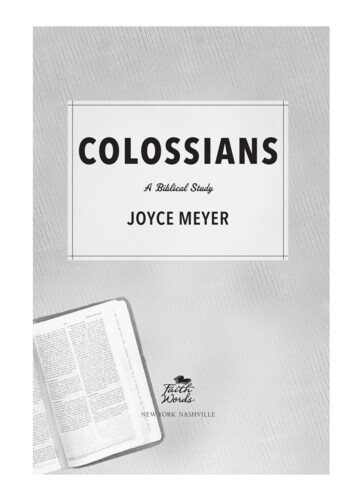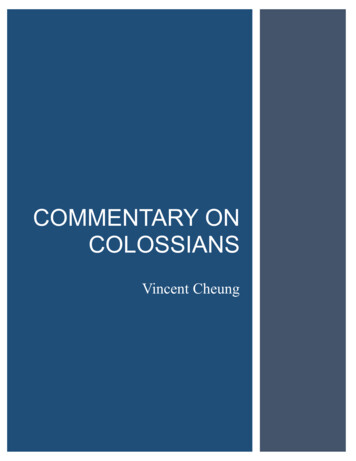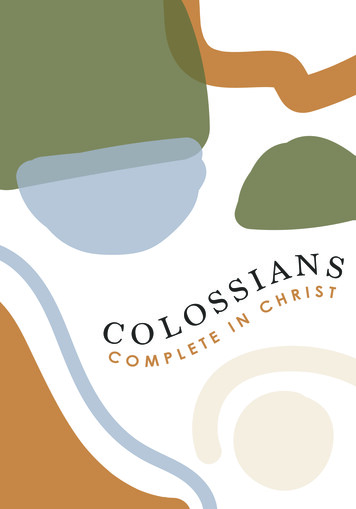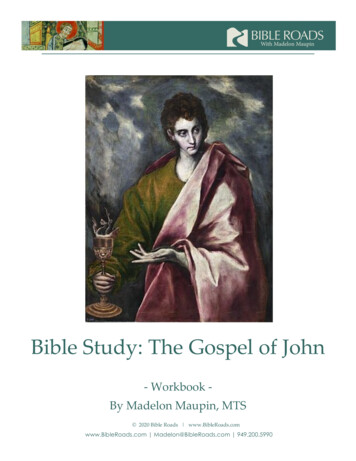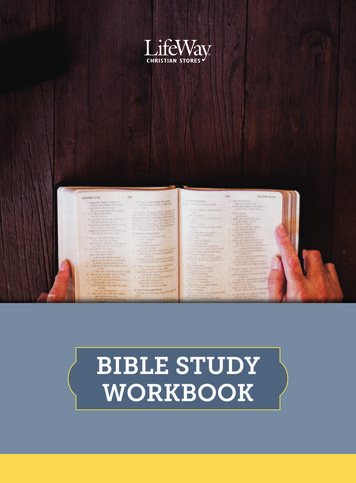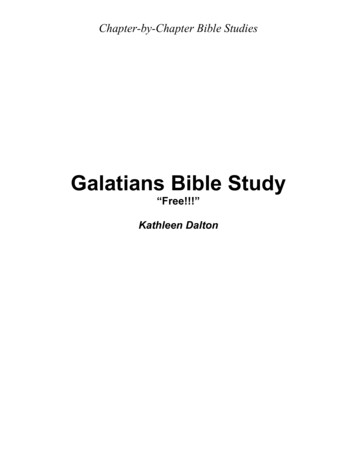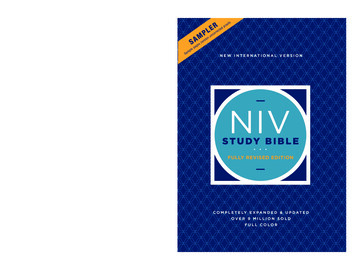
Transcription
1
COLOSSIANSSNOWBIRD WILDERNESSOUTFITTERS2
2020 Snowbird Wilderness OutfittersAll rights reserved. This book or any portion thereofmay not be reproduced or used in any mannerwithout the expressed permission of SnowbirdWilderness Outfitters.Printed in the United States of AmericaSnowbird Wilderness Outfitters75 Mae Johnson WayAndrews, NC 28901www.swoutfitters.comBible Translation Copyright InformationUnless otherwise indicated, all Scripture quotationsare taken from the ESV Global Study Bible, ESV BibleCopyright 2012 by CrosswayAll rights reserved.Content: Zach MabryPrepared for Publishing by: Flannelgraph Creative3
Places to Go.INTRODUCTION10Chapter 112Greetings and IntroductionSummaryApostleWill of GodSaintsFaithful BrothersGrace and PeaceWhat Does This Mean for Me?Chapter 222Thanksgiving and PrayerSummaryWhen Do They Pray?Faith in Christ JesusLove for the SaintsBecause of Their HopeWhat Do They Pray?Filled with the Knowledge of His WillTo Walk Worthy of the LordBearing FruitIncreasing in the Knowledge of God4
StrengthenedGiving Thanks with JoyWhat Does This Mean for Me?Chapter 338The Preeminence of ChristSummaryImage of GodFirstborn of CreationHe Created All ThingsHe is Before All ThingsHe Sustains All ThingsHe is the Head of the ChurchFirstborn from the DeadHe is PreeminentMaking PeaceWhat Does This Mean for Me?Chapter 455Christ in You the Hope of GlorySummaryYou Were ReconciledHope of the GospelRejoicing in SufferingThe Mystery pt1 - The Word of GodThe Mystery pt2 - Christ in YouThis We ProclaimThe Struggle5
Hearts Encouraged and Joined TogetherThe Mystery pt3 - ChristI'm Telling You This So You Won't Be Deceived.What Does This Mean for Me?Chapter 573Walk In HimSummaryWalk in Him - Instead of HeresyWatch Out! - for False TeachingTwo PicturesVictorious Christ - Nailing Our Sin to the CrossWhat Does This Mean for Me?Chapter 690Let No One Disqualify YouSummaryDo Not Let Anyone Judge YouDo Not Let Anyone Condemn YouIf You Died with Christ, Why Aren’t You LivingLikeit?What Does This Mean for Me?Chapter 7103Seek the Things that are Above6
SummaryYou were Raised with Christ.So Seek the Above Kind of ThingsWhere Christ is SeatedSet Your MindYou DiedYour Life has Been HiddenChrist is Your LifeWhen Christ is Revealed, So Will WeWhat Does that Mean for Me?Chapter 8117Put to DeathSummaryPut to DeathThe Earthly ThingsThe Wrath of God is ComingYou Formerly Walked in Them When You wereLivinginThemPut OffDo Not LieChrist is All and In AllWhat Does that Mean for Me?Chapter 9133Put on Holiness7
SummaryClothe YourselvesSo What Are We to Put On?Chosen, Holy, BelovedBearing with, and ForgivingPut On LoveLet the Peace of Christ Control YouBe ThankfulLet the Word of Christ Make Its Dwelling in YouDo Everything in the Name of the Lord JesusWhat Does This Mean for Me?Practical ObedienceSummaryWives, SubmitHusbands, LoveChildren, ObeyFathers, Do Not ProvokeSlaves, ObeyObeyWork for the LordServe the LordMasters, Be Just and FairWhat Does This Mean for Me?Chapter 11170General InstructionsSummary8
Busy Yourself in PrayerBeing WatchfulPrayingWalk In WisdomMaking the Most of the TimeLet Your Words Be GraciousWhat Does This Mean for Me?Chapter 12183Closing WordsSummaryTychicusOnesimusAristarchus and JustusMarkEpaphrasLuke and DemasDemas is a Different Story.NymphaArchippusRememberGraceWhat Does This Mean for Me?9
INTRODUCTIONThe first step in Christian growth is the studyof God's Word. Remember that God hasgiven us His Word, not for some kind ofacademic discipline, but so we can know Him betterthrough it.In light of that, one of the most importantthings we can do together as Christians is to workthrough different passages of the Bible with eachother. What a great way for God to convict us, teachus, and lead us into instant accountability.For this reason, we will be going through thebook of Colossians together as a staff. Granted,some of you can work through a book of the Bible a10
lot faster than others, but remember this is anexercise not just for you but for us together.This study guide will help you know how tostudy the Bible and help set a pace so you can studytogether. Each section of this guide will focus on aparticular passage of the book of Colossians,provide context, attempt to explain what God issaying, and offer questions to guide you in personalapplication.Let’s use these questions (and others that youcome up with) to help us dig deeper into God’sWord and apply it to our lives.11
Chapter 1Greetings andIntroductionColossians 1:1-2Colossians 1:1-2Paul, an apostle of Christ Jesus by the will ofGod, and Timothy, our brother. To the saints andfaithful brothers in Christ at Colossae: Grace to youand peace from God our Father.12
SUMMARYColossians is a letter written by the Apostle Paul(along with Timothy) to the Church of Colossae. Themembers of the church are both Jews and Gentiles,with the majority being Gentiles. There is a little bitof ambiguity as to when and where Paul was whenhe wrote this letter, but we are going to say that itwas probably around the year AD 60 and that Paulwas writing from Rome during his first imprisonment.Why would this make any difference as to howwe interpret the letter?Well, think about it. This guy is in jail becauseof his testimony for the Gospel. It's not like he'swriting from a beach house somewhere. The contextin which Paul is writing will affect the way that weinterpret what he is saying.13
The next thing that we need to keep in mindis that there is a good chance that Paul did not knowmost of these people personally.Interesting so why is he writing to them? Hehas heard of their faith and their Christian conduct,and he wants to encourage them and aid in theirdiscipleship.This is really cool because they have areputation that has made it all the way to Paul inRome. They are faithfully living out the Gospel insuch a way that the world is hearing.Is that true of us?Would our Christian conduct be the firstthing people think of when they hear aboutus?14
Not only does Paul want to encourage them, but hewants to warn them. We don't know exactly whatkind of false teaching is coming their way, but itlooks like there is some sort of heresy threateningthe Church of Colossae, and they need to be ontheir guard. We can figure out a little bit about thespecifics like it might be some kind of Jewishlegalism mixed with a dash of pagan mysticism(more on all that later). Still, the remedy is the same:focus on Jesus and the Gospel. This is timely for us,as well. The best thing to counteract false teaching isgood, solid, Biblical teaching.WHAT IS THE TEXT SAYING?APOSTLEPaul describes himself as an apostle. As you mayhave heard before, apostle comes from a Greekword that means, "to send out," and surely Paul is15
claiming to have been sent out by Jesus. However,this is being used in a more technical sense in thisverse. Paul is not just saying that Jesus sent him out(which he has) he is claiming to have authority asone who holds the office of an apostle. Paul has aspecial role to be able to speak into the lives ofbelievers because He was personally selected byJesus Christ to be his representative here on theearth (for more on this look at Acts 9 and Galatians1).So Paul is actually claiming that you shouldlisten to what he has to say because the messagethat he is bringing is from Jesus.WILL OF GODIn addition to this, his apostleship is according to thewill of God. God set Paul apart before he was bornfor the role that he is now playing in the church. Thisis another strong argument for the authority of what16
Paul has to say. If you are going to go against thecouncil that Paul is giving to you in this letter, you aresetting yourself up in opposition to the will of God.SAINTSPaul is not just talking about himself in hisintroduction. He uses very powerful words todescribe his readers in Colossae (and by extensionus) by referring to them as "saints." Now, for many ofus, we do not have a healthy, biblical understandingof the word "saints." When I hear this, my firstthought is of the Catholic Church with their huge listof saints for this or that occupation (did you knowthat Saint Agatha is the Patron Saint of Bakers?).But if you were to directly translate this word,it would actually be "holy ones." Wow! Paul is sayingthat the Colossians are holy! Why would he say that?Because they have been made holy in Christ! Thismeans that you and I need to have a shift in the waythat we think about our identity too. If you are in17
Christ, then by this same teaching, you need tounderstand that you are holy as well. That is a bigdeal. This is Paul's favorite word to use in describingChristians and uses it 15 times in his NT writings forthat purpose.FAITHFUL BROTHERSNot only does he call them "holy," but he calls them"faithful brothers in Christ." For Paul, the mostimportant connection that we can have to oneanother is to be a part of God's family. God is ourFather, and we are brothers and sisters. Our unitytogether is found in our union with Christ. We areco-heirs with Christ (Romans 8:17).What is striking about this is that it doesn't justaffect our vertical relationship with God (we are Hissons and daughters), but our horizontal relationshipwith each other (we are brothers and sisters inChrist). How different would our lives look if we18
actually lived out what it means to treat each otheras if we a part of the same family? The irony is thatwe will be brothers and sisters in the same family foreternity!GRACE AND PEACEThis is the crux of Paul's introduction and serves as aset up for the rest of the letter.In the time period that Paul is writing, it wascommon for people to write letters and start themoff with, "greetings." Here Paul has changed that to"grace and peace," but it is more than just astandard greeting. He wants grace and peace toform everything he is saying in the letter.In fact, he uses "grace," five times, includingending the letter with, "grace be with you." Thiswhole letter can be seen as a way of extending19
grace and peace to the Christians who were living inColossae, but not only to them but to us as well.What Does This Mean for Me?1. How do you see yourself? Do you see yourself asholy? Is your identity in Christ? If so, what doesthat mean? How does that affect the way you liveyour life?2. See how Paul had a good understanding of hiscalling, what about you? What is it that God hascalled you to? How do you need to use thatcalling to minister to others?3. How do I view other Christians? Do I see them asholy? Do I see them as my brothers and sisters?Am I treating them as God's son or daughter andmy brother or sister?20
4. How can I be a conduit of grace and peace toothers?21
Chapter 2Thanksgiving andPrayerColossians 1:3-14Colossians 1:3-8We always thank God, the Father of our LordJesus Christ, when we pray for you, since we heard ofyour faith in Christ Jesus and of the love that youhave for all the saints, because of the hope laid upfor you in heaven. Of this, you have heard before inthe word of the truth, the Gospel, which has come toyou, as indeed in the whole world it is bearing fruitand increasing—as it also does among you, since the22
day you heard it and understood the grace of God intruth, just as you learned it from Epaphras, ourbeloved fellow servant. He is a faithful minister ofChrist on your behalf and has made known to us yourlove in the Spirit.Colossians 1:9-14And so, from the day we heard, we have notceased to pray for you, asking that you maybe filled with the knowledge of His will in allspiritual wisdom and understanding, so as towalk in a manner worthy of the Lord, fullypleasing to Him, bearing fruit in every goodwork and increasing in the knowledge ofGod; being strengthened with all power,according to His glorious might, for allendurance and patience with joy; givingthanks to the Father, who has qualified you toshare in the inheritance of the saints in light.He has delivered us from the domain ofdarkness and transferred us to the kingdomof His beloved Son, in whom we haveredemption, the forgiveness of sins.23
SUMMARYHere we get to see into the prayer life of the apostlePaul, specifically in his prayer for the believers inColossae. Now, remember, he has not met thesebrothers and sisters, but that doesn't stop him frompraying for them and praying for them often. Twotimes in this little prayer, we see where he mentionsthat he is constantly praying for them (always, notceased). Not only this, but we get to see why he ispraying for them and the content of his prayer forthem.The most challenging aspect of this prayercomes when we look at the spiritual realities thatPaul articulates regarding the Colossian believers,simply because they are in Christ. It is important thatwe see ourselves in this same light and learn fromhis prayer for the Colossian Church and apply thesetruths to our lives.24
WHAT IS THE TEXT SAYING?WHEN DO THEY PRAY?Paul (and Timothy) are always praying for theirbrothers and sisters at Colossae. Because of Paul'srole in the church, he knows that the church inColossae will listen to what he has to say to them.However, he isn't just writing them a letter tellingthem to "get with the program." He genuinely lovesthem and constantly takes his concern for thembefore our Father in Heaven. Here he even takes thetime to say that God is the Father of the Lord JesusChrist. He is identifying himself as a brother to themand a servant of Jesus. Ever since they heard thatthere was a church in Colossae, they have beenpraying for them.Why do they pray?25
News of their devotion to God made its way to aRoman prison. Let's look at the specificity of whatPaul has heard about them.FAITH IN CHRIST JESUSThis is another way of saying that they have becomeChristians. They have confessed, repented, and puttheir faith in Jesus as their savior. This has to do withthe vertical dimension of their relationship with God.LOVE FOR THE SAINTSThey have a genuine love for other Christians.Because their lives have been changed by theGospel, they have a love for others in the householdof faith. This has to do with the horizontal dimensionof their relationships with others.26
BECAUSE OF THEIR HOPENotice that faith and love are grounded in theirhope. They have faith in God and love for othersbecause of the hope they have in Christ. You haveprobably heard this before, but Paul is not using theword "hope" like we commonly use it. We say"hope" when we don't really think something isgoing to happen. "Man, I hope this is over soon." Butwhen the Bible uses the word "hope," it involves aconfident belief in what is going to happen in thefuture, based on our unshakeable confidence inGod. This is awesome. We have an eternal, securedhope in heaven. It's there for us, already (1 Peter1:3-5).They have this hope because they haveresponded appropriately to the Gospel, which herefers to as "the word of truth." It is striking the waythat Paul refers to their conversion. He uses thewords "heard, understood, and learned." This is27
integral to his letter since he is trying to clarify theGospel message in light of this immanent heresy.This Gospel has gone over the entire worldand is "bearing fruit and increasing." This phrase isfascinating for two reasons. First, because he comesright back to it in verse 10, regarding how theColossians are progressing in their faith. Second,because it appears to be a reference to Genesis1:28, where God commands our first parents to "befruitful and multiply" (in the Septuagint - the Greekversion of the Old Testament - these are the sametwo verbs). This is a cool thought because theGospel is doing spiritually, what Adam and Eve werecommanded to do physically.In their context, it was Epaphras that wasdoing the work of the Gospel as he is the one whoshared it with them. Because of this, Paul commendshim for his faithful work to Jesus on their behalf.28
And, it is because of Epaphras that Paul and Timothyeven heard about the faith of the Colossians. Paulcalls him a "fellow slave" and "faithful servant."WHAT DO THEY PRAY?This is the most exciting part of this passagebecause it helps us understand Paul's (and theLord's) desire for the Colossian believers, and byextension, to us as God's children. We get insightinto what the work of sanctification should look likein our lives as we submit to the work of the Lord inus. It should also lead us to how we pray for ourgrowth in Christ and the continued discipleship ofour brothers and sisters.FILLED WITH THE KNOWLEDGE OF HISWILLThis is the main point of their prayer; everything elsecomes off of this. And this is no simple request. By29
extension, we need to be filled with the knowledgeof God's will, which is characterized by "all wisdom"and "spiritual understanding." Let's look deeper intothis.Since Paul is praying for this to happen, andsince the verb "to be filled" is in the passive voice,we realize that it is God who fills us with thisknowledge. However, that doesn't mean that we areinactive in our sanctification, right? Where are we tofind this knowledge? In God's revealed Word! Godhas given us the key to understanding His will in theBible (John 17:17).TO WALK WORTHY OF THE LORDWow. What does that even mean? This word“worthy” is only used six times in the New Testament,five of those are by Paul. Romans 16:2 - "Worthy of the saints."30
Ephesians 4:1 - "Walk in a manner worthy ofthe calling with which you have beencalled" Philippians 1:27 - "Let your manner of lifebe worthy of the Gospel." 1 Thessalonians 2:12 - "Walk worthy ofGod."Our understanding of God's will should lead us tolive lives like Jesus. What a heavy thought. This is abyproduct of the Spirit's work inside us. It is insightthat the Spirit of God gives us that enables us to liveour lives in a way that is pleasing to God.BEARING FRUITThis is another way of saying that as we grow in ourrelationship with God, we will bear fruit thataccompanies our faith in the Lord Jesus Christ.Scripture uses the term "fruit" both for actions andattitudes, and a disciple of Jesus should be bearing31
both. Our actions should represent that we arefollowing the Lord. These should be coming fromattitudes that represent the Holy Spirit of God atwork in our lives (Galatians 5:22-24)INCREASING IN THE KNOWLEDGE OFGODA logical corollary to this would be the increase ofour knowledge of God. Again, he is highlighting the"intellectual" aspect of the Christian life. And, ofcourse, it makes perfect sense that if our knowledgeof God through His Word is what sets us on thecourse of Christlikeness, then we will continue toknow both more of Him and to know Him more.STRENGTHENED(God's Strength Endurance andPatience)32
But is the Christian life difficult? Assuredly so. Andlet's not forget that we are getting this letter from aman in prison for the Gospel. We need to havestrength of will to continue, but thanks be to Godthat He will fill us with His strength. Our God has anunending storehouse of strength with which to fill us.Paul prays that the Colossians will be strengthenedwith all strength, according to God's glorious might(or the might of His glory). What an encouragement!This will lead us to have increased enduranceand patience. Our process of sanctification requiresus to set a course and continue. We need strengthand fortitude, and God has it to give to us.GIVING THANKS WITH JOYThere is a slight debate on where the "with joy"should go in this passage. I have decided to put it ina different place than the ESV (choosing to agreewith the NASB and CSV). The giving of thanks33
provides a bridge for us in this section because it iscoming off of what it means to walk worthy of God,and it explains the following section as reasons forwhich we should be giving God thanks.First, as we continue to grow in our Christiandiscipleship, our lives should be characterized byjoyfully giving thanks to God. This flows naturallyfrom the fact that we recognize that our maturity asbelievers comes directly from His hands. He is theone who is sanctifying us.Second, we should constantly be givingthanks for our salvation. Paul uses some awesomeword pictures to talk about our new status asbelievers. In extending salvation to us, God hasmade us qualified to have a portion of His eternalinheritance, along with all the other saints of God.34
We, who were once, blind and ignorant, havebecome receptors of His light. We, who were oncelost, have been rescued from the authority anddomain of darkness and transferred into thekingdom of the beloved Son of God. We, who wereonce slaves to sin, have been purchased by theblood of Jesus. We have redemption, that is to say,the forgiveness from all our sins.What Does This Mean for Me?1. Christians are thankful people. Paul is givingthanks for the Colossians and praying that theywill grow in the faith, and one aspect of this isbeing joyfully thankful. How do I characterizemyself? Am I a thankful person? Am I growing ingratitude? How grateful am I to God for mysalvation?35
2. Prayer: What can I learn about the way Paul ispraying for these Christians?A. Do I pray for others like this? If I was seriouslypraying for the spiritual growth of others likethis, I would love them more and treat thembetter. So why don't I?B. Am I praying well for myself? Am I focused onprayer in my personal growth in Christ?C. Am I praying for the Holy Spirit to give mewisdom and understanding? How can I praymore intentionally for my sanctification?3. Do I have this kind of hope? Have I internalizedthe fact that I have an eternal hope reserved inHeaven for me? Is this leading me to deepen myfaith in Jesus and increase my love of others?4. Am I studying God's Word as I should? I shouldbe praying that God will give me a knowledge ofHis will, but if I'm not disciplining myself to seekHim through His Word, this is just a hollowprayer.36
5. Am I walking/living in a way that is worthy of Godand pleasing to Him? That is such a heavythought. Take a minute and seriously thinkthrough this. Ask God to reveal areas of sin andhypocrisy to you.6. Where's my identity? Do I see myself as rescued?Do I see myself as an heir of God's inheritance?Do I see myself as purchased by God? Do I seemyself as forgiven?37
Chapter 3The Preeminence ofChristColossians 1:15-23Colossians 1:15-20He is the image of the invisible God, the firstborn ofall Creation. For by Him, all things were created, inheaven and on earth, visible and invisible, whetherthrones or dominions or rulers or authorities—allthings were created through Him and for Him. AndHe is before all things, and in Him, all things holdtogether. And He is the head of the body, the38
Church. He is the beginning, the firstborn from thedead, that in everything he might be preeminent. Forin Him, all the fullness of God was pleased to dwell,and through him to reconcile to Himself all things,whether on earth or in heaven, making peace by theblood of His cross.Colossians 1:21-23And you, who once were alienated andhostile in mind, doing evil deeds, He has nowreconciled in His body of flesh by His death,in order to present you holy and blamelessand above reproach before Him, if indeedyou continue in the faith, stable and steadfast,not shifting from the hope of the Gospel thatyou heard, which has been proclaimed in allcreation under heaven, and of which I, Paul,became a minister.39
SUMMARYThis is absolutely awesome! It is slamma jamma fullof deep theological truths. This little section ispacked with the knowledge of how we need to viewJesus more accurately and, in turn, how we shouldrespond. It has been characterized as an early"Christ hymn" and is definitely written in a way tomake it more easily memorized. (You should alsolisten to Andrew Peterson's song "All ThingsTogether" so you can memorize it easily as well.)This section follows the last section as adeeper explanation of the "in Him" in whom we haveredemption and will focus on the exaltation of Jesus.We will see Him exalted both in creation and inredemption. Simply put, He is exalted in the createdorder, because He, Himself, brought it all intoexistence and is actively sustaining it. He is exalted inredemption rising from the dead and providing theonly means of reconciliation with God the Father. His40
sacrificial death and resurrection are presented asthe only means of attaining genuine, eternal peace.For us to really get to what God is saying to usthrough this passage, we are going to have to do acouple little word studies.Word of Caution: you can get yourself intodangerous waters by doing word studies just because someone uses the same word assomeone else doesn't mean that they mean itin the same way. Every word (regardless oflanguage) will have a certain "semanticrange." That is just a fancy way of saying thatit can mean different things or ideas. So whatis the determining factor? And they allsaid "context." That's right, context. Weneed to work hard to see how the biblicalwriters are using these specifi c words incontext to understand what they mean by41
them. Now, with those words of caution, wewill proceed.WHAT IS THE TEXT SAYING?IMAGE OF GODWhen you see "image of God," it should bringseveral different ideas into your thoughts. First, weremember that Adam was created "in the image ofGod." And Paul, very well, could be referencing thispassage from Genesis 1:27. We saw in the lastsection that he could have alluded to Genesis 1:28,so it would make sense if that is in his consciousthoughts as he writes this. Not only that but thisbeginning section of the "Christ hymn" is focusingon the supremacy of Jesus in creation. Plus, Paul willoften make comparisons in his writings betweenAdam and Jesus. We know that Jesus was the42
perfect Adam, He was the only human being to everbe 100% faithful to God in all things.Next, we turn to the idea that Jesus, Himself, isthe image of God. What does he mean when he saysthat Jesus is the "image of the invisible God"? He issaying that Jesus is the visible image of the invisibleGod. This doesn't mean that Jesus is less than God.In fact, it means that He, Himself is God. Paul talksabout this on other occasions as well. An importantcross-reference here is:2 Corinthians 4:4-6“In their case the God of this world hasblinded the minds of the unbelievers, to keepthem from seeing the light of the Gospel ofthe glory of Christ, who is the image of God.For what we proclaim is not ourselves, butJesus Christ as Lord, with ourselves as yourservants for Jesus' sake. For God, who said,43
'Let light shine out of darkness,' has shone inour hearts to give the light of the knowledgeof the glory of God in the face of JesusChrist.”In both of these texts, it is clear that Jesus is God andthe representation of the glory of God. As wecontinue in this text, it will become even more clearthat Jesus Christ is God and should be worshipped,both by virtue of His creation of all and the salvationthat He offers.The last aspect of the "image of God" is alogical outcome of the first two. Human beings weremade in the image of God and failed to beobedient. Yet Jesus came as the perfect Adam whofulfilled all righteousness. Now, in Christ, we too, arebeing made into the image of God. This is acommon theme in Paul's other writings that he is44
setting up here and will bring back around inColossians 3:10.First, let's look at those other passages to geta frame of reference:Romans 8:29“For those whom He foreknew, He alsopredestined to be conformed to the image ofHis Son, in order that He might be thefirstborn among many brothers.”1 Corinthians 15:49“Just as we have borne the image of the manof dust, we shall also bear the image of theMan of Heaven.”2 Corinthians 3:18“And we all, with unveiled face, beholding theglory of the Lord, are being transformed into45
the same image from one degree of glory toanother. For this comes from the Lord, who isthe Spirit.”See all these themes coming together? We arehuman beings after the image of Adam in ourphysical realities, but God made us (and is makingus) like Jesus, after His image. This is exactly wherePaul is heading in the letter to the Colossians. Andsince we can, let's peek ahead for just a second toColossians 3:10 "and have put on the new self, whichis being renewed in knowledge after the image of itsCreator." This is where we are going, both in theletter and in our sanctification.FIRSTBORN OF CREATIONThis is a very interesting concept that we need totake a second to think through since it is prettyforeign to our cultural context. When the Bible usesthe term "firstborn," it isn't always referring to the46
actual first child born. And in this passage, we knowthat it couldn't be used that way because Adam wasthe first human born in creation, not Jesus. So it mustmean something else. Instead of thinking offirstborn in a literal birth order way, we need to thinkof it as a "positional" reality. Does that make sense?When you get a minute, you can check out theHebrew practice regarding the privileges of thefirstborn (Deuteronomy 21:15-17), but for now, let'sfocus on the idea that the firstborn has a special,preeminent position.Jesus is said to be the firstborn in twodifferent aspects in this hymn: "of creation," and "ofthe dead." The first is "of creation." And look at howPaul grounds his argument. He is saying that Jesushas supremacy in creation because He is the onewho created all things. Now, in case you wantedclarification for what he means by "all things," Paul ishappy to oblige.47
HE CREATED ALL THINGSHere is where Paul gets super technical and overcommunicates. He is not satisfied to leave it as "allthings." Jesus created everything in heaven andeverything on earth. Want more specificity? If it isvisible, Jesus created it. If it is invisible (which I'll behonest, I don't even have a concept in my head howsomebody could create something that
study the Bible and help set a pace so you can study together. Each section of this guide will focus on a particular passage of the book of Colossians, provide context, attempt to explain what God is saying, and offer questions to guide you in personal ap
